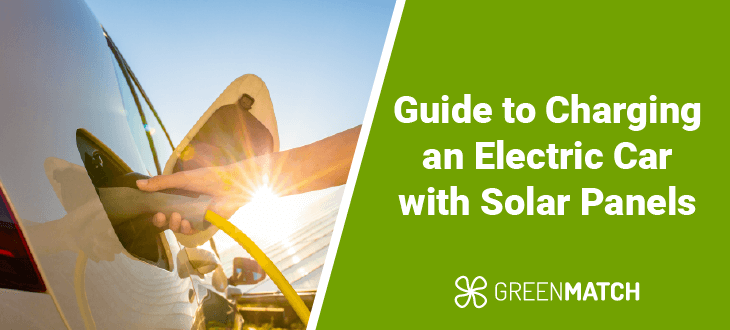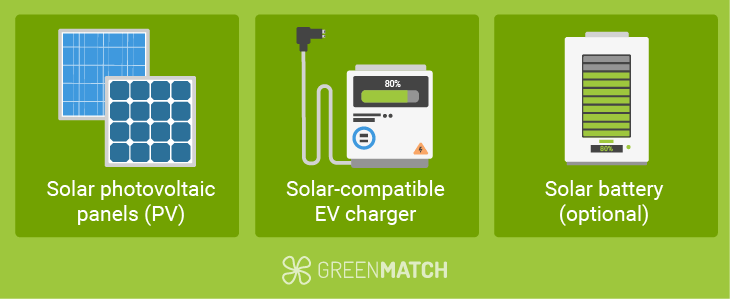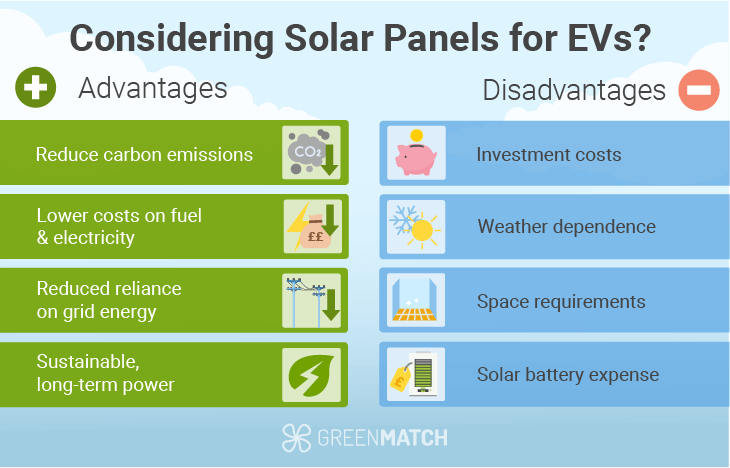Answer these simple questions and we will find you the BEST prices
Which type of solar quotes do you need?
It only takes 30 seconds
100% free with no obligation

Get up to 4 quotes by filling in only 1 quick form

Slash your energy bills by installing solar panels

For the average 2-3 bedroom house
- GreenMatch
- Solar Energy
- Solar Panels
- Solar Panels to Charge Electric Cars
Solar Panels to Charge Electric Cars in the UK (March 2025)


- It is possible to charge an electric car with solar panels, using a compatible home EV charger.
- You will need between 8 and 13 solar panels, charging can take as little as 5 hours, depending on the size of your car battery and the speed of your charger.
- Using solar panels to charge an electric car can reduce carbon emissions and save the average household over £400 a year.
Solar panels offer homeowners a way of generating clean, renewable energy to power their homes. So can they also charge our electric vehicles? In short, yes! Solar-compatible chargers can take the energy generated by your solar panels and use it to charge an electric vehicle.
In the UK, electric vehicles (EVs) are quickly becoming the first choice for many drivers. Not only do they reduce carbon emissions, but they also cut down on expensive, fluctuating fuel costs. Almost 5% of UK homeowners have solar panels installed, meaning they could benefit even further by using clean, renewable solar energy to power their electric cars.
In this article, we’ll take a look at exactly how you can use solar panels to charge your electric car, what set up you will need, and the pros and cons you need to consider. We’ll also explore the costs to install solar panels and potential savings.
Are you interested in getting solar panels? Looking to run your home on a renewable energy source? But are unsure where to begin? We can help!
Avoid wasting precious hours searching the web for qualified, reliable solar installers in your area.
Instead, fill in our simple 30-second form and we’ll find them for you.
Get up to 4 free quotes from our professional network of vetted installers, with no obligations attached.
Click below to get started!
- Quotes from local engineers
- Payment by finance available
- Save up to £1,020 per year
It only takes 30 seconds



Can solar panels charge a car?
Yes! Solar panels can charge an electric vehicle, as long as you have the right equipment installed. You will need the following setup:

Installing solar panels for your home means you can generate electricity (from sunlight). This energy is usually used to power home appliances, but it can also be used to supply your at-home EV charging point.
You should ensure, however, that you have a solar compatible EV charger which can easily integrate with your solar panel system. This means that any electricity generated by your panels can be directed to your charging point.
Alternatively, if you also use a solar battery to store excess energy, some models will divert this excess directly to your EV charger, giving you clean, free energy to power your vehicle. A solar battery is particularly useful if you want to charge your vehicle overnight using solar energy, as it can store solar you have generated during the day.
Using this energy means you can have a solar powered car and avoid using grid electricity, reducing your energy costs considerably.
How many solar panels do you need to charge electric cars in the UK?
The average home, with 2-3 bedrooms, will need between 8 and 13 solar panels, to generate enough power to run household appliances. However, the number of solar panels required to charge an electric car depends on several factors, including:
-
Car battery size
Larger battery capacities require more solar power to fully charge. -
Daily driving distance
The distance you travel daily impacts the amount of energy needed. -
Desired charging speed
Faster charging times necessitate a larger solar system. -
Location and climate
The amount of sunlight available in your region affects solar panel efficiency.
For the average home, a 4 - 5kW solar panel system (8 - 13 panels) would be sufficient to power an EV charger of around 3.6kW. For most UK homes, however, a larger charger of 7.4kW is typically the most recommended option as it can charge more quickly.
The table below shows how many solar panels you need, depending on house size, along with estimated installation costs.
| Solar Panels Required Per House Size | |||
|---|---|---|---|
| Household Size | Solar System Size | Estimated Number of Solar Panels (350W or 450W) | Solar Panel Costs (including installation) |
| 1 - 2 bedrooms | 2 - 3kW | 4 - 8 | £2,500 - £5,500 |
| 2 - 3 bedrooms | 4 - 5kW | 8 - 13 | £5,000 - £8,500 |
| 4 - 5 bedrooms | 6kW | 13 - 16 | £9,500 - £10,500 |
If your electric vehicle requires a higher kilowatt charge rate, you might want to consider a larger power supply, such as a 6kW solar panel system. If your solar power output is lower, you will have to supplement your car charge with grid energy.
The cost to charge your electric car with grid energy, will vary depending on your energy tariff and car battery size.
For example, if your tariff is 30p per kWh and your battery is 100 kWh, the cost to fully charge your car would be approximately £30. You can estimate these costs by multiplying the tariff by the battery size, and dividing this by 100 (i.e. 30 x 100 = 300 / 100 = 30).
It's important to consult with a qualified EV charger installer who can assess your specific situation, including your home's electrical capacity and your vehicle's charging capabilities, to recommend the most suitable charger size for your needs.
How long would it take to charge an electric car with solar panels?
Charging an electric car with solar panels can take between 4 to 30 hours, depending on the size of the car battery, the speed of the charger, and weather conditions.
For example, if you have a 40kWh car battery and a standard EV charger with 3.6kW power, you can expect to charge your vehicle in just over 11 hours. This time can be significantly reduced to just over 5 hours if you choose to install a faster charger, with 7.4kW power.
Below are some examples of charging times, using typical at-home charging points for various battery sizes. These estimates are based on charging a car from 0% to 100% and are only indicative of the actual time it can take to charge an electric vehicle, with solar panel energy, from your home.
| Battery Size (kWh) | Vehicle Examples | 3.6kW (Slow) | 7.4kW(Fast) |
|---|---|---|---|
| 30 | Small, 2-door city car; supermini | 8.33 hours | 4.05 hours |
| 40 | 11.11 hours | 5.41 hours | |
| 50 | 4-door family car; hatchback, sedan, coupe, convertible | 13.89 hours | 6.76 hours |
| 60 | 16.67 hours | 8.11 hours | |
| 80 | Minivan, people carrier, van | 22.22 hours | 10.81 hours |
| 100 | 27.78 hours | 13.51 hours |
If you’re interested in pairing solar panels with your electric vehicle charger, it’s important to get the right advice so you can install the appropriate number of solar panels for your needs. To understand solar panel costs in the UK and get the most out of your installation, we recommend consulting a trusted professional.
Trying to find local installers on your own can take hours, causing you stress and unnecessary hassle.
Skip the endless web searches and let us help instead.
Filling in our 30-second form can connect you with up to 4 local installers, for free! With no obligations attached.
Click below to get started.
- Quotes from local engineers
- Payment by finance available
- Save up to £1,020 per year
It only takes 30 seconds



Pros and cons of solar panels to charge electric vehicles
Charging an electric vehicle with solar panels has many benefits, but there are some key points you should also think about before you make the switch. Below are some of the pros and cons for you to consider.

Pros of solar panels for electric vehicles
Environmental benefits:
Solar panels generate clean energy, reducing reliance on fossil fuels and significantly cutting carbon emissions. This helps mitigate climate change and improve air quality.
Cost savings:
Solar panels can generate electricity for your home, potentially reducing your reliance on the grid and lowering your electricity bills over time. In addition, solar grants and government incentives can help support many homeowners with the cost of installing solar panels.
For example, the ECO4 scheme can help lower-income households (and those who meet set criteria) to install solar panels as part of home improvement upgrades.
Energy independence:
For many people, fluctuating grid energy prices can cause ongoing stress and financial strain. Installing solar panels can help elevate that pressure, as homes can generate their own, free, renewable energy source.
Whilst this won’t mean complete separation from the grid, it can significantly reduce a home's reliance on national energy. In addition, schemes like the Smart Export Guarantee can also boost household income, allowing any excess solar energy to be sent back to the grid in exchange for payment.
Sustainability:
Solar panels are a long-term, sustainable solution for powering homes and electric vehicles. They have a lifespan of 25 - 30 years, making them a reliable and environmentally friendly investment.
Cons of solar panels for electric vehicles
Initial investment:
The initial cost of purchasing and installing solar panels can be significant. However, government incentives and potential long-term savings can help offset this investment if you are eligible.
In addition, you may require a solar battery in order to benefit from the ability to store the energy you generate. Without this, you won’t have access to solar energy during the night - which is when many people will choose to charge their vehicles. Solar battery costs range from £230 to £10,000 depending on the size you need.
Weather dependence:
Solar panels rely on sunlight to generate electricity. In regions with limited sunlight or during cloudy weather, energy production may be reduced. The amount of sunlight available can vary throughout the year, affecting energy production.
Space requirements:
Solar panels require adequate space to capture sunlight efficiently. This may necessitate roof-mounted or ground-mounted installations, which may not be feasible for all homes.
While solar panels offer numerous advantages for charging electric vehicles, it's essential to carefully consider these factors to determine if this solution is suitable for your specific needs and circumstances.
Are solar panels for EV charging worth it in the UK?
Yes! Solar panels can be well worth the investment if you wish to run your electric vehicle on a renewable energy source. Solar panels are also a great way to power your home appliances and reduce your overall energy costs.
By limiting your reliance on grid energy, you can save over £400 per year, just by using solar panel-generated energy instead. You can also earn significant repayments through the Smart Export Guarantee, adding up to £85 additional income to your household each year, when selling excess energy back to the grid.
Solar panels are not only great for the environment, but they also last for 25 - 30 years, helping you to keep your electric vehicle powered on renewable energy for many years to come.
If you’re interested in installing solar panels, to help power your home and charge your vehicle, it’s best to compare quotes from several installers to ensure you get the right advice and the best price for your needs.
Rather than spending days scouring the internet and struggling to compare costs and hidden charges, why not fill out our simple 30-second form, and let us do the rest?
We can find you up to 4 free quotes, from our network of trusted, vetted installers from your area.
Simply click the link below to get started.
- Quotes from local engineers
- Payment by finance available
- Save up to £1,020 per year
It only takes 30 seconds



FAQ
Yes! Using solar panels to charge your vehicle helps reduce harmful emissions. Solar panels can also save you over £400 a year on household energy bills.
Yes, if you have solar panels installed at your home a compatible EV charger can direct solar energy to your car battery. There are pros and cons to using solar panels this way though, which are worth careful consideration.
In theory, yes, but this would take a very long time. The best way to use solar energy to charge a car is to install solar panels at home. This way you can generate free, renewable energy and divert it to your EV charger.
It can take between 4 and 30 hours to charge a car using solar panels. How long it takes to fully charge an electric car this way, depends on the size of the car battery and speed of the charger (weather conditions will also have some impact).

Becky is an experienced SEO content writer specialising in sustainability and renewable trends. Her background in broadcast journalism inspires reliable content to help readers live more sustainably every day.
We strive to connect our customers with the right product and supplier. Would you like to be part of GreenMatch?




